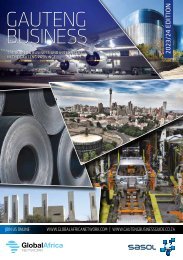Free State Business 2019 edition
Free State Business is a unique guide to business and investment in the Free State Province of South Africa. The Free State has several investment and business opportunities. The official launch of the Maluti-A-Phofung Special Economic Zone is a significant event for the economy of South Africa’s most centrally located province. Overviews on each of the key economic sectors provide up-to-date information on trends in the mining and tourism sectors, for example. Regular information about the size and nature of each sector is also included.
Free State Business is a unique guide to business and investment in the Free State Province of South Africa. The Free State has several investment and business opportunities.
The official launch of the Maluti-A-Phofung Special Economic Zone is a significant event for the economy of South Africa’s most centrally located province. Overviews on each of the key economic sectors provide up-to-date information on trends in the mining and tourism sectors, for example. Regular information about the size and nature of each sector is also included.
You also want an ePaper? Increase the reach of your titles
YUMPU automatically turns print PDFs into web optimized ePapers that Google loves.
OVERVIEW<br />
Education and training<br />
The University of the <strong>Free</strong> <strong>State</strong> is a research leader.<br />
That the University of the <strong>Free</strong> <strong>State</strong> (UFS) should have increased<br />
its research output since 2010 should not be a surprise, but<br />
the percentage by which it has upped its work-rate is an<br />
eye-opener – 221%.<br />
The UFS has 158 researchers rated by the National Research<br />
Foundation (NRF), two A-rated scientists and five tier-one SARChi<br />
research chairs. The university has 18 international research partnerships<br />
and produces an average of 240 postgraduate research<br />
degrees every year.<br />
Twelve new buildings have appeared on one of the university’s<br />
three campuses (or satellites) since 2012 and a further 157 have been<br />
renovated. The Faculty of Health Sciences building is pictured. Others<br />
include a high-performance gymnasium and new buildings for the<br />
Education and Health faculties. On the Qwaqwa campus, a new Physics<br />
and Geography complex has been constructed. A total of 40 000<br />
students study under 2 521 permanent staff members in 114 departments<br />
in seven faculties.<br />
Central University of Technology (CUT) has a main campus in<br />
Bloemfontein and branches in Welkom and Kimberley. There are<br />
three faculties: Engineering and Information and Communication<br />
Technology, Health and Environmental Sciences, and Management<br />
Sciences. Researchers at units such as the Centre for Community,<br />
Environmental and Industrial Development tackle important<br />
regional issues.<br />
The Centre for Rapid Prototyping and Manufacturing (CRPM)<br />
does research into manufacturing processes. It specialises in Additive<br />
Manufacturing (AM), also known as 3D printing. CRPM works in the<br />
commercial field as well as doing research in Rapid Prototyping, Rapid<br />
Manufacturing, Rapid Tooling and Medical Product Development<br />
technologies. Manufacturers can make prototypes more easily (in<br />
sand, metal or plastic) with the support of the CRPM.<br />
Basic education and training statistics show that access to schooling<br />
and training has increased markedly in recent years. Enrolment in Grade<br />
R (reception year) is increasing rapidly. There are 663 public schools and<br />
263 other community sites offering schooling in the <strong>Free</strong> <strong>State</strong>. The<br />
number of hostels has increased from 12 in 2009 to 33 in 2016. School<br />
transport is provided to more than 10 000 pupils.<br />
Mamello Secondary School in the Lejweleputswa Municipality<br />
received a maths laboratory in 2017 from Sibanye-Stillwater mining<br />
company. Education is central to many corporate social investment<br />
initiatives in the <strong>Free</strong> <strong>State</strong>. The school has more than 1 300 pupils.<br />
SECTOR INSIGHT<br />
Sasol needs 16 artisans for<br />
every engineer it employs.<br />
The lab is fitted with an electronic<br />
board and laptops (for teachers)<br />
and tablets have also been<br />
supplied.<br />
The <strong>Free</strong> <strong>State</strong> Provincial<br />
Government is implementing<br />
South Africa’s largest global skills<br />
development programme in support<br />
of implementation of the<br />
National Development Plan (NDP).<br />
The free overseas training programme<br />
entails about 905 students<br />
studying in leading universities in<br />
China, India, Germany, Portugal,<br />
Russia, Turkey and Belarus.<br />
Fields of study range from all<br />
kinds of engineering, to computer<br />
science, medicine and pharmacy.<br />
India is hosting 32 students in the<br />
health sciences sector. Germany is<br />
hosting 68 students in sustainable<br />
mining and remediation, computer<br />
engineering, international trade<br />
economics, electrical chemicals<br />
engineering, molecular biology<br />
and genetics, and civil engineering.<br />
Belarus has 17 students in the field<br />
of informatics, applied chemistry<br />
and radio electronics. Turkey hosts<br />
206 students.<br />
Russia is hosting 230 students<br />
in the fields of medicine, agriprocessing,<br />
veterinary medicine,<br />
agronomy and agriculture. Portugal<br />
is hosting 119 students in tourism<br />
FREE STATE BUSINESS <strong>2019</strong><br />
42


















